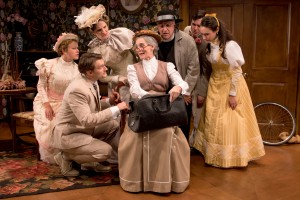
The Gamm opened their season last week with Oscar Wilde’s The Importance of Being Earnest, directed by Fred Sullivan, Jr. It’s a strong, albeit thoroughly traditional, production of the play; designer Patrick Lynch’s beautifully set-dressed and very Victorian sitting room is the first thing the audience sees and it sets the tone for the show as a whole, while Sullivan’s smooth direction mostly lets Wilde do the work.
Jeff Church was born to play roles like Jack Worthing; not only can he speak Wilde’s words as naturally as breathing, it also felt unusually clear to me what substance all of that style was a cover for. Church’s performance, as a result, is all the funnier for how natural it is – the instinctive generation of wit by the character to cover real emotions like worry (because how unsophisticated would it be to have genuine emotions?) came across very clearly, rather than feeling like excuses for one-liners.
Church, along with Marc Dante Mancini as Algernon Moncrieff, the more flippant and carefree of the pair, meet their match in Nora Eschenheimer, as Gwendolen Fairfax, and Alison Russo, as Cecily Cardew, two headstrong young women whose mutual desire to marry a man called “Ernest” drives the plot. Both dominate their scenes (making the scene where they face off against each other almost more of a full-scale battle than a duel): Russo’s Cecily, raised in an isolated country house, seems to be the mistress of a domain too small for her ambitions, and Eschenheimer’s Gwendolen takes very much after her mother, the formidable Lady Bracknell.
As for Lady Bracknell, Deb Martin’s over-the-top acting is better suited for that character than for Lady Croom in last year’s Arcadia, but her best moments are still those when the character is actually angry or distressed. At other times, it’s too hard to believe that she’s representing the gatekeeper of respectable society, but she certainly is a presence in exactly the way Lady Bracknell needs to be, from her very first appearance in a costume giving her a slight resemblance to a terrifying bird of prey (costumes by David T. Howard). Tom Gleadow is delightful in the smaller role of Reverend Chasuble, and Jeanine Kane as Miss Prism rounds out the talented cast, who also sing and play instruments in a few scene-change interludes (music directed by Milly Massey).
I’ve left out one person – The Gamm’s big gimmick, of course, is the inclusion of Oscar Wilde himself as a character, played by Brandon Whitehead as an emcee and guide to the show. Audience members around me loved it, as well as Whitehead’s mugging in various small roles, but in my opinion the frame story didn’t add anything. Indeed, alluding in several places pre-intermission to the events leading to Wilde’s imprisonment for homosexuality (for those who read the program notes or are familiar), but dropping the frame story after intermission and making no attempt to bring Wilde’s life either into tension or into resolution with the multiple happy heterosexual marriages that end the play, struck me as tasteless. Whitehead does a fine job, but Sullivan’s concept is too underdeveloped to work.
I suppose one of the questions to be answered with this play is whether it’s relevant anymore and whether that matters. A few of the lines that Sullivan restored from earlier drafts of the play make it especially clear that Wilde’s characters are not isolated from social and political concerns and that if they live in a bubble, it is one of their own choosing (Cecily is assigned to read Political Economy, but warned that her observation of the relationship between class and idleness “sounds like socialism”). Dramaturg Rachel Walshe’s program note draws parallels to social media in talking about how the characters construct their lives and selves through words and performance, and I found that that idea particularly resonated in Church’s and Russo’s performances (such as the scene in which Cecily asks Algernon to repeat his proposal so she can copy it into her diary). So why restore the character of Moulton the gardener just to give him an ad-lib about building a wall to keep the foreigners out? It’s a cheap shot in the mouth of a minor servant role that lets off the upper-class characters fancying themselves educated but apolitical – is the play relevant or not?
The Importance of Being Earnest runs thru Oct 15; The Gamm Theatre, 172 Exchange St, Pawtucket. For tickets, go to gammtheatre.org/boxoffice


